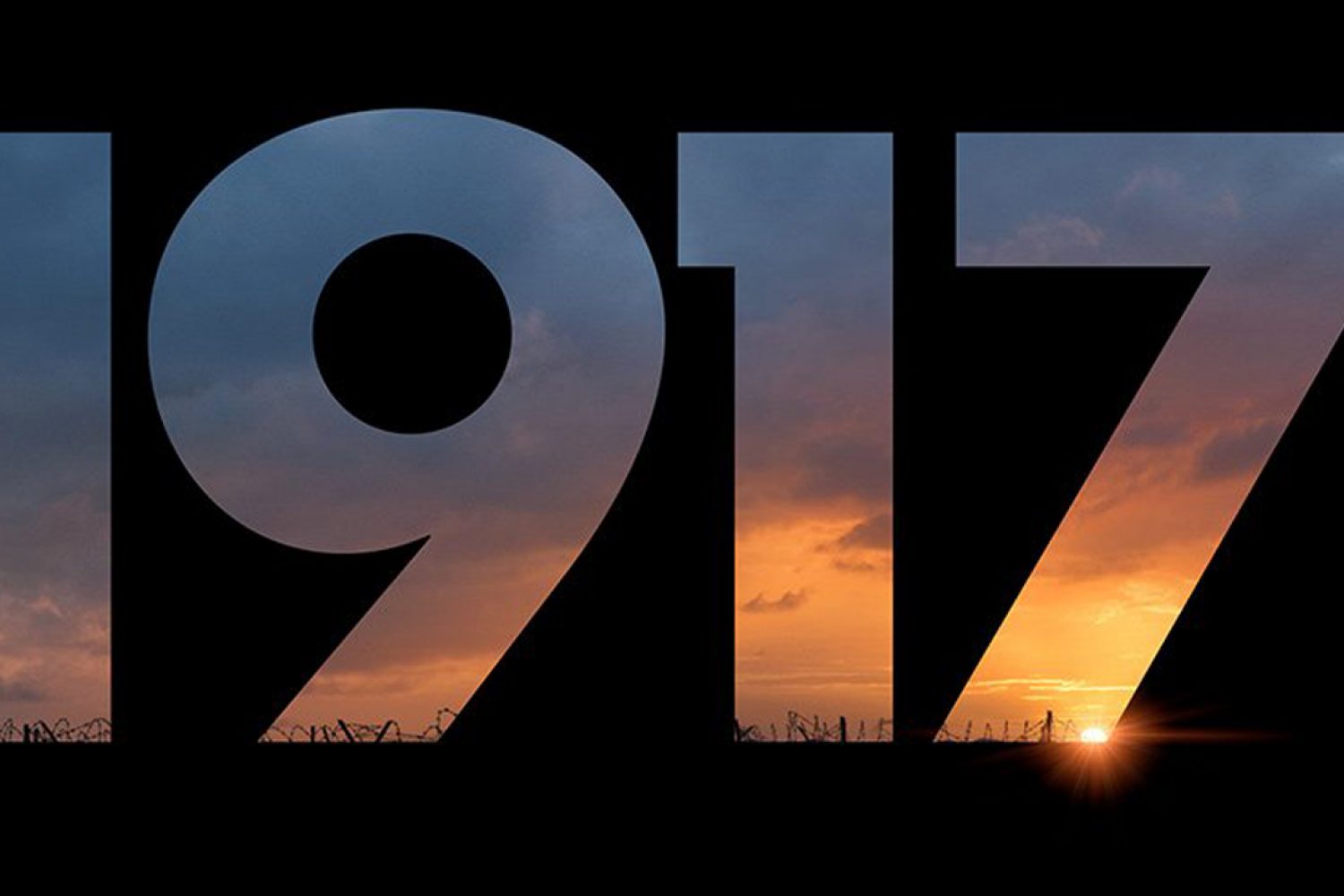by Johannes Wolters (c)
At the height of the First World War, two young British soldiers, Schofield (Captain Fantastic’s George MacKay) and Blake (Game of Thrones’ Dean-Charles Chapman) are given a seemingly impossible mission. In a race against time, they must cross enemy territory and deliver a message that will stop a deadly attack on hundreds of soldiers—Blake’s own brother among them.
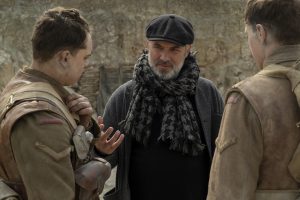
(from left) Dean-Charles Chapman, director/co-writer Sam Mendes and George MacKay on the set of 1917.
1917 is directed by Sam Mendes, who wrote the screenplay with Krysty Wilson-Cairns (Showtime’s Penny Dreadful). The film is produced by Mendes and Pippa Harris (co-executive producer, Revolutionary Road; executive producer, Away We Go) for their Neal Street Productions, Jayne-Ann Tenggren (co-producer, The Rhythm Section; associate producer, Spectre), Callum McDougall (executive producer, Mary Poppins Returns, Skyfall) and Brian Oliver (executive producer, Rocketman; Black Swan).
The film is nominated for ten Academy Awards and already won two Golden Globes for best film and best director.
Johannes Wolters met Sam Mendes at Berlin and interviewed him for around 20 minutes.
Johannes Wolters: What is harder to show in film: being cold or being exhausted?
Sam Mendes: If you „are“ cold or exhausted, I think that helps! What is harder to show? Gosh! I think, cold actually is harder. Because exhaustion you can act. But you know, I think one of the things about this movie is that. I was sought of asking them, – more then I have done in any other movie -, to live through it, rather then to just act it, because, you know, for long stretches, ten, eleven minutes, they were just „go“! And even so, if you rehearsed it, you are hoping that you get closer to human behavior… they were not too concerned about how they looked, at a certain point they even became somehow unaware where the camera was.
JW:This film is not so much about what story you are telling but how you tell it. How did you develop this specific form of storytelling?
Sam Mendes: Unlike the „The Revenant“ or „Birdman“, both of which movies I greatly admire, this was very much treating time as a real element, you know. Birdman was kind of surreal, time was elastic, but here I suppose, the choice to shoot it as a „One shot“, was meant to connect the audience as much as possible to the real experience of the journey. And it was not much more complicated as that! So to know that every second that passed, you are getting closer or further away and to feel trapped with the men, sometimes claustrophobic and then I suppose the challenge was to not make it repetitive, to not get trapped just behind them or just in front of them, but to know when the camera was subjective and you are connected emotionally and objective when you could just get to see them small in this vast landscape of death and destruction. At times you want to tell the audience exactly where to look. And at times you want to allow the audience´s eye to roam about details that are not directly presented to you… So it became a relationship between camera, actor and space rather then just camera and actor and that was where it became complicated. But I had the idea at the same time as the idea for the story. The story was delivering a a message in two hours 40 minutes in real time and what if it was one shot? So you felt that time passing second by second. And I wrote it always with that in mind…
JW: You rehearsed for six months?
Sam Mendes: They were young actors. So I was not breaking the bank to rehearse with them for so long. But really: that made a big difference. A big difference. That was not the reason I choosed them. The rehearsing was more for me and for Roger (Deakins) but I was also aware by doing it repetitively over a long period of time they would take ownership of the part themselves. And they would become more and more comfortable wearing their outfit. I made them wear the kit, carrying their guns all the time, so it would become second nature to them. So it turned out to be very useful for them as well. The other thing I was able to do, which I have done to a degree in theatre, was just let them do it and watch and not comment on it for a while and see how it naturally developed – rather then „Now, what you want to do, is this and this!“ Sometimes I would just say: „Here is a script, you are walking down the hill, talking, take your guns, go!“ And they just went! And I watched. I would just trott alongside them and then I would walk backwards in front of them then I would walk behind them – me and Roger would talk and then we would do it again. Then we would give some barrier in the scene so they had to turn a corner, or shifted. And the language developed, one step with the actors and one step with the camera like that – rather then mapping out the exact journey and determine it early. So,it was really a good way to work. I can´t imagine… we rehearsed six months, that doesn´t mean we worked every day for six months. But across a six month period.
JW: Rehearsing was part of previs then?
Sam Mendes: No, … well kind of. It was live previs!
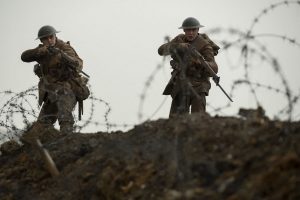
(from left) Blake (Dean-Charles Chapman) and Schofield (George MacKay) in 1917, the new epic from Oscar®-winning filmmaker Sam Mendes.
JW: The story of the film came to you from your grandfather?
Sam Mendes: My grandfather told me many stories about the first World War. He was there as a seventeen year old. The movie is a magnification of one of the stories my grandfarther told me. But many things in it did not happen to him. And Schofield or Blake, they are not my grandfather. The movie was not about my grandfather, the movie is because of my grandfather, which is different. The stories he told me, they were not stories about heroism or how brave he was. But about how tennous life was – there were stories about chance and coincidence. And how thin the line between life and death was… Why was it that his friend who was standing next to him was hit by a shell and just disappeared and not he? So what was left, was a young boy, what I learned from it was more existential then it was a history lesson… you know. I did not want to make a movie about the first World War. I wanted to see through a keyhole the human experience of war. That was what I was trying to reach for…
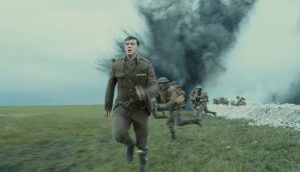
George MacKay (forefront) as Schofield in 1917, the new epic from Oscar®-winning filmmaker Sam Mendes.
JW: Did you asked him about the war?
Sam Mendes: Yes, we asked him all the time! Me and my cousins. „Tell us a story, tell us stories!“ He did not tell his children, he did not tell my father. He never told my father anything! But his grandchildren did managed to bring it out of him. It came out of the fact that he used to wash his hands incessantly. And I would laugh at him, we would all laugh at him. And I asked my father, why does Granddad wash his hands all the time? And he answered „He remembers the mud of the trenches and he could never get clean.“ That really stayed with me. He was then in his Midseventies. So it had been over fifty years since he had fought in the war. And it was still part of his being. And he did not think about it when he washed his hands. It just became a habit. That is, what a learned from my grandfather. It was never an intellectualisation of it and nor was it a history lesson. It took me a while to work out who was fighting whom and why. When I was a kid, it just was the great war. For the British it remains this, that is what they call it. „Le Grand Guerre“ what they call it in France. This is not a political movie in the sense that, I do believe – and I do not say that because I am sitting here in germany – I do believe, that the same movie could be told about two french soldiers or two german soldiers or two belgian soldiers. I think the enemy is out there somewhere. But then when he encounters them, they are men like him like him who are confused – when he meets that boy in the burning town. Just another figure just like him, younger still, who doesn´t know what he is doing and doesn´t want to fight. And he is confused and frightened. And that is where this movie sits, rather then somewhere like „Paths of Glory“ which tries to find a way to offer some explanation as to why the war happens or the madness of the war. Why the generals are sending him, that does not involve itself at all with the overview. Its reaching for a human truth rather then a political truth. You ask yourself, why make a war movie? Or indeed, why watch a war movie? And it is because of, in war, in exremis, the human beings reveal themselves. They strip to the essence. In extreme circumstances how do human beings behave, what matters to them? A brother, a friend, going home? What are those things? What are we capable of? If those things are threatened. That is the root of that film, I think!
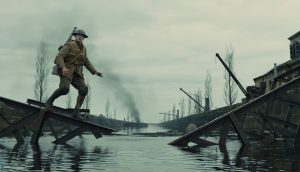
George MacKay as Schofield in 1917, the new epic from Oscar®-winning filmmaker Sam Mendes.
JW: How did you find the balance between paying respect to the experience of the people, representing those aspects, the experiences of the people, those atrocities of war with building this cinematic experience for the audience?
Sam Mendes: In a way, I feel like,… It is a good question because really it is a balance. And it is very difficult. And I did think about that a lot. I thought no piggy backing on the suffering of many people to make an entertainment. But everything has a narrative, you know. Every person in this room has a narrative. And this is part of that days narrative. The trick was not to push it to the point where it is not longer believable. But also, if you hit something like Nomansland, you are asking the camera to bear witness to something. And it is a big difference to that and showing the audience everything. „Look there, look there!“ Sometimes you are just saying „We are moving through the landscape and in your peripheral vision, if you care to look, is death or rats or crows or worms or bodies. Is it bodies or is it mud? That is just outside of you it feels like the world goes off that way. These two characters, one of them, if you notice… Scofield; when he moves throught he Nomansland he does not look at anything. And the other can´t stop looking. And it is your choice which one of those two people you are. The camera is not going hey look at that, look at that! I felt very strongly that you had to somehow just bear witness to it. This existed. And this is just thousand of a percent of what was there. That is just what they see. But somehow you are allowed to make your own choice. So it is a good question You do not want to use it to your own ends. And I hope, … even those people playing the smaler roles, Colin Firth, Benedict Cumberbatch, Andrew Scott, all those guys… you want to feel like… you are just intersecting with their lives. But their lives are in many ways bigger and more epic then the characters we are following. You crossing over these huge narratives. But you see them [Sam Mendes snaps with his fingers] and they are gone. And then another one. The crucial thing is to believe, that the lives you meet, go of the edge of the screen and to a real life. As opposed to void when the cameras turns off. So that feeling of passing through other narratives, other people who are struggling. One of the things Krysty [Wilson-Cairns], my co-writer and I was talking about after the event, was wouldn´t it be fascinating if we did two hours of real time about three other characters in the movie – Mark Strong´s character – what happens to him? Where did he end up? He is in charge of two hundred men in those trucks. What happens to them. Or even people you go by in a flash like the guy, Captain Ivens, played by a wonderful actor called Justin Edwards who is the man he meets in the final trenches, who is just crying. What has happened there? Every person has a huge story. And you just see the tip of an iceberg. So, that feeling that you are passing through lives that are just taking place. And you have no idea how these people have got there and where they are going. That was part of what was important about the fabric of the film as well. So it did not feel like everything is just presented to the camera and stopped the moment the camera moved off.
JW: The film seems to leave reality behind at a certain point and becomes more mythical. Like stepping down into the underworld crossing the the river styx with all the bodies in it.
Sam Mendes: There was a mythical element to the whole war in reality. Yes, i mean, you could say, they travel through the various circles of hell. There is a Danteesk feeling about it, but an apocalyptic feeling from that war. And there seemed to be no sense, no overall reason. And also you are pushing, you know, you are trying to access the audience´s subconscious in a way, that the movie, the story accessed my, pulled at my subconscious. So you are striving for the quality of a dream at times with the stakes of reality. So when you are going to the burning town for example, he wakes up – you do not know whether he is awake or asleep on some level. Neither does he. He doesn´t know what day it is, he has almost forgotten what his mission is, why he is there. He is just stumbling blindly forward into this weird strange world on which the ground is moving around him. That is very conscioulsy like a hallucination. And I pushed Roger Deakins and the flares ,so that would be almost an most extreme… Tom Newman with his score at the same time pushing into something more expressionistic. So you feel that this is some psychic disturbance way beyond the reality. Because you think you got it by that time: Okay, it is the ticking clock! And he is going through this. He lost his friend, that was a surprise but I think I get it now! And then bam! [claps his hands] He is out! And now you really do not know. What are the rules? Is he gonna die? Is that gonna be the end of the movie? Does he not make it at all? Yes sure, he does make it. But he does not make it in time. You know, we tried to not be corny about how he dealt with how that became…
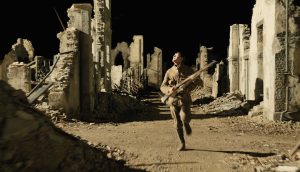
George MacKay as Schofield in 1917, the new epic from Oscar®-winning filmmaker Sam Mendes.
JW: You did two James Bond movies. What was more complicated. Those or this here?
Sam Mendes: (laughs) Mmmh. Bond was more complicated. Because Bond is like actually going to war. Here, this was about war. (laughs) You know, there are so many moving parts. And you can´t see them all. You have all the units. And you have a lot of kind of strategic planning in terms of how to mechanics of things work There was something wonderful with this movie here, it was very difficult but it was methodical. And piece by piece we moved in one line. You ask any director and he will tell you that shooting on one camera is wonderful compared to shooting with three cameras. Or four, five, six, seven… When you shut down the whole of Mexico City and you have twelve cameras and helicopters and all kind of shit. And that is just the very first five minutes of the movie. And five thousand costumes extras. As you are walking across priceless aztec ruins… That is complicated and makes you tense… you know. That is not a relaxing situation. While this is difficult but I felt absolutely focused all the time. Like I was in a tunnel. And nothing could or would distract me or disturb me from this tunnel… And again it was difficult to walk this amount of miles every day. I was outside in the countryside and because there was an element of this movie that was also about nature how this is off hands these people are raising this to the ground but it will come back. It is the spring. In a beautiful irony this happens in the spring when the leaves are coming out and blossoms are coming again and some life is returning to the world. And the rivers are running with freshly fallen rain. And the natural world is just giving the finger to these stupid human beings who are trampling it. And I loved that! And I loved feeling being a part of the natural world. And having visited northern france where the battlefields are. And seeing that the world has returned again. It was very moving.
JW: In the end sense is not to be found in a piece of metal but in a wonderful handshake.
Sam Mendes: Yes, right. Absolutely. That was very much my grandfather. He was not interested in being told that he has been brave. But he was interested in the people around him who he cared for. And that was the people who he fought with and of course his family he wanted to get back to. He wanted to have the acceptance of his parents. Who disapproved of him fighting. They did not want him to go to war at all. He ignored their orders and he went anyway. It makes you… I would be lying, if I said, I did not put a lot of myself into the movie emotionally. For example I started writing when I had a one month old child. My fourth child is now two. But she was just born then. And you know it is not by chance that he is stumbling on a small baby girl and in fact that was of all the scenes I had to shoot the most upsetting because however much how difficult it is that you are going into nomansland you are dealing with adults, they know what they are doing. who understand what they are part of. But when you have a helpless child, that does not know that it is in a movie. And then you to put it into a scene where they have no mother. I know that sounds crazy, but it is very upsetting. The human cost of war. At that point in the war. This level of destruction. The civilian deaths as well as military deaths…
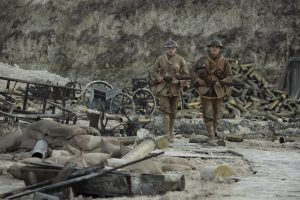
(from left) Schofield (George MacKay) and Blake (Dean-Charles Chapman) in 1917, co-written and directed by Sam Mendes.
JW: It is strange that we see all that in a comfortable cinema. How did those experiences changed your grandfather?
Sam Mendes: I think he was left with a sense of the precariousness of life. Knowing that how anything that follows after an experience like that is like a tightrope walk and so often I think he was filled with joy for just being alive. So that is pretty corny in a way. But what else do you take out of that except how lucky you are to be still here. And value the things that you have. But it was not an intellectualisation of war. It was not a, you know, he had no theories. Just observations and memories.
JW: Did he ever thought about turning his memories it into a movie?
Sam Mendes: Funnily my granddad was a novellist he published four or five books and an autobiography. All of his personal wartime stories are in his autobiography. He was a storyteller and one the reasons he told his stories to us so well was because this was what he did for a living. He was very theatrical, very charismatic, very smart. And with a big booming voice. And a theatrical audience turned phrase And he wanted me to be a writer! „You are going to be a writer! I want you to write a novel before I die!“ And he made me sign a little contract. A joke. But he did! And I never managed it… Not surprisingly. I never managed to write a novel. He died at 1991. So I was in my early twenties… But he would have been delighted. That this story emerged out of his stories. And he would have seen it for what it was. Which is from the heart but also fiction. And he admired invention and narrative imagination.
JW: Thank you!
Sam Mendes: Thank you!

